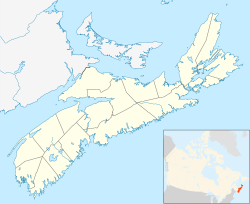Chester, Nova Scotia
| Chester, Nova Scotia | |
|---|---|
| Village | |
 |
|
| Motto: A Progressive Community | |
| Location of Chester in Nova Scotia | |
| Coordinates: 44°32′25″N 64°14′23″W / 44.54028°N 64.23972°WCoordinates: 44°32′25″N 64°14′23″W / 44.54028°N 64.23972°W | |
| Country |
|
| Province |
|
| County | Lunenburg County. |
| Municipality | Chester Municipal District |
| Founded | 1759 |
| Incorporated | 1963 |
| Government | |
| • Warden | Allen Webber |
| • Chief Administrative Officer | Tammy Wilson |
| Elevation | 17 m (56 ft) |
| Population (2011) | |
| • Urban | 2,348 |
| Time zone | AST (UTC-4) |
| • Summer (DST) | ADT (UTC-3) |
| Postal code | B0J 1J0 |
| Area code(s) | 902 |
| Telephone Exchanges | 273 275 277 279 299 980 |
| NTS Map | 021A09 |
| GNBC Code | CAGYN |
| Website | chester.ca |
| Part of a series about Places in Nova Scotia | |
Chester is a village located in Nova Scotia, Canada. It is part of Nova Scotia's Chester Municipal District in the southeastern part of Lunenburg County.
Chester was officially founded in 1759 during the French and Indian War. It was the Shoreham grant, although French fishermen had already built a few houses on the site. The first permanent European-descended settlers were a group from Massachusetts who came to the area in 1761.
During the American Revolution, the village avoided a raid by American Privateers wherein the townswomen, young and old, garbed in cloaks with their red lining worn outwards (to resemble the uniforms of the British soldiers) marched around the blockhouse (now the Wisteria Cottage House) in the early morning of 30 June 1782 to successfully convince American Privateers lying offshore to find another place to pillage. The following day the privateers successfully executed the Raid on Lunenburg, Nova Scotia (1782).
During the War of 1812, the American Privateer Young Teazer was trapped off the shores of Chester by the HMS Hogue (1811). To avoid capture, a crew member of the Young Teazer destroyed his own ship, killing most of the crew.
After World War I, to honour the 54 soldiers from the area that were killed, the famous New York sculptor J. Massey Rhind was commissioned to make the Nova Scotia Highlander soldier cenotaph. After the war the Women's Institute of Nova Scotia established the Zoé Vallé Memorial Library.
Chester is one of the wealthiest communities in the province as a result of being a holiday and resort destination, with many seasonal and year-round estates and mansions. The nearby waters of Mahone Bay and its numerous islands are well known for yachting and have made the Chester Yacht Club into a cruising destination. A Provincial ferry from the village provides a schedule of daily trips to Big Tancook Island and Little Tancook Island.
...
Wikipedia

